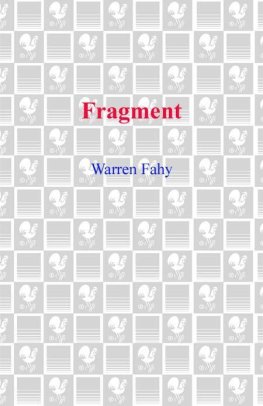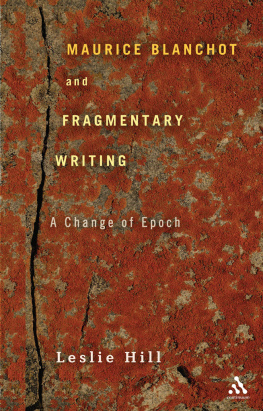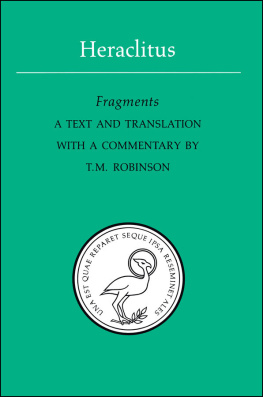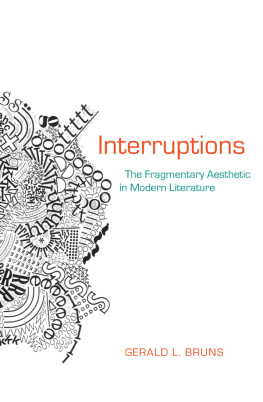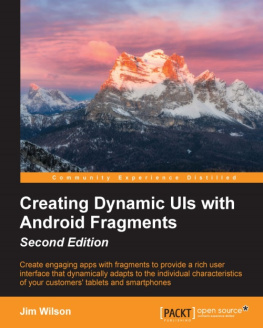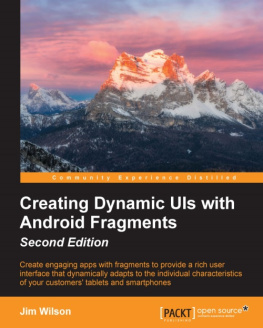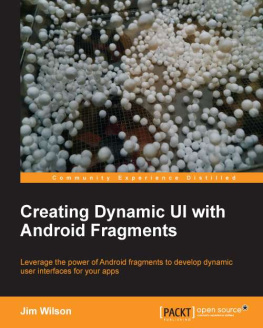The Fragment: Towards a History and Poetics of a Performative Genre
Camelia Elias
Table of Contents
Preface / v
Acknowledgements / vii
~
Introduction / 1
~
Part One
The Coercive Fragment / 33
The Consensual Fragment / 71
The Redundant, Repetitive, and Resolute Fragment / 117
~
Part Two
~
The Ekphrastic Fragment / 157
The Epigrammatic, Epigraphic, and Emblematic Fragment / 207
The Epitaphic Fragment / 303
~
Conclusion / 353
~
Bibliography / 373
~
Index / 387
Preface
A truly fragmentary genre must be thanking. One spares only a few words to those people who nevertheless deserve more. My fragments of gratitude thus go to the following people, all involvedin the process of writing:
First, the professors: Lars Ole Sauerberg, for helping me put the first draft into shape and according me great autonomy in my seeking fragments out, even when that activity involved a walk in thedark or desert. I have appreciated very much his invaluable advice and promptitude. Michael Riffaterre, for contributing to my gathering of fragments of knowledge and for the kind of criticism which always goes against thegrain of ordinary remarks. One gains a whole new perspective on ones inconcrete problem, when Riffaterre declares, upon being presented with one such, that in his opinion, all metaphysicians shouldbe hanged. Mark C. Taylor, for his incredible support. I have enjoyed immensely all his comments submitted to e-mail truncations, texts which lent themselves to the discovery of ekphrastic fragments, and otherwise.Avital Ronell, for her enthusiasm for anything fragment. Jacques Derrida, for insisting that there is no such thing as a fragment, while also insisting that it is a good idea indeed to write about fragments. Charles Lock,for being a true erudite, and for his willingness to share his knowledge as a friend and as a scholar. In both capacities, Charless imagination, often manifesting itself in the finest form of literary puns, has enrichedthe consistence of this work. Marcel Bnabou for always finding fragments, including mine.
Closer to home: my friend Sren Hattesen Balle. My sister Mana, for never having read a novel, while consuming tomes of poetry books, who taught me that fragments really are nothing but intellectualclowns imitating poetry. Paul David, Manas son, for his musical fragments anything from Scarlatti to Sati, and a dash of own postmodern compositions in between them which he insisted on playing on thepiano for me, over the phone all the way from Romania. (Hes only 9, so I forgive him) Ida, for her fine friendship, and for providing a second home always equipped with the best for relaxation, including great storytelling.
Finally, Bent, for being the wittiest person Ive known. One could even contend, wittingly or not, that hes the embodiment of Richelieus wit, only in musketeer clothes. Thankyou for the blessings, cardinal points in my life.
I dedicate this book to the memory of my mother and my father.
Acknowledgements
Earlier versions of chapters in this book have appeared in the following venues:
Parts of the chapter The Consensual Fragment have appeared as Wit as Final Aesthetic Imperative: the Fragmentary and the Incomplete in Schlegel, Blanchot, and Jabs. Aesthetic Experience and Interpretation. Ed. Lars-Olof hlberg. The Nordic Journal of Aesthetics (Nordisk Estetisk Tidskrift) Nr. 24 2001
Parts of the chapter The Ekphrastic Fragment have appeared as Ekphrastic Plastic Fragments: Mark C. Taylor In and Out of Context. Journal for Cultural and Religious Theory . Issue 5.2. Ed. Carl Raschke. April 2001
Parts of the chapter The Epigrammatic Fragment have appeared as Fragmentary Epigrams: Marcel Bnabou's Authorial Mise-en-Scne. Literary Research - Recherche Littraire . Ed. Calin-Andrei Mihailescu. Journal of the International Comparative Literature Association. Vol. 19 Nos. 37-38. London: University of Western OntarioPress 2002, and Narrative in a Nutshell: Epigrammatic Fragmentary Writing. From Homer to Hypertext: StudiesinNarrative, Literature, Media. Ed. Anders Klinkby Madsen and Hans Balling. Odense: Odense Universitetsforlag 2002
Parts of the Conclusion have appeared as Ten Theses on the Fragment. Respiro - Fast-Forward Culture . Ed. Paul Doru Mugur. Issue 10. March 2003
Introduction
FRAGMENT , n. In literature, a composition which the author had not the skill to finish.
Ambrose Bierce
The fragmentary imperative calls upon us to sense that there is as yet nothing fragmentary, not properly speaking, but improperly speaking.
Maurice Blanchot
But as yet no genre exists that is fragmentary both in form and content.
Friedrich Schlegel
Understanding the concept of fragment is first and foremost a question of style. For how is one to approach that which only exists in a state of plurality? The etymology ofthe word fragment indicates that much. The word derives from the Latin fragmentum , remnant, whose root, frangere , means to break into fragments. One of the aspects of the root frangere is that it points to a necessary plurality of fragments, since it is logically impossible to break a whole into one fragment. Most definitions drawing upon the above etymology,presuppose, formally speaking, that a relation between part and whole is constitutive of the notion of the fragment. The consequence of defining the fragment in terms of a part/whole relation is that the fragment is alwaysseen as derived from and subordinate to an original whole text. This has marked the entire research tradition on the fragment which has tended to focus on the fragments (ruined) form and (incomplete) content.
The Improper Fragment
It can be said that where critical discourse on the fragment distinguishes between extracting the part ( fragmentum ) from the whole (the body of fragmenti as a consequence of breaking), the fragment as a text in its own right does not always obey the will-to-completionimposed upon the fragment as a remnant. That is to say, where the fragment in critical discourse most often becomes the object of definitions of incompleteness, ruin, residue, the fragmentas such seems to enjoy the status of being , existing independent of formal constraints. Here, however, I must already anticipate some criticism to the notion of the fragment in its own right,or as I later refer to, the fragment proper, labelled as such by some critics. Obviously, for something to be proper it must either belong to something else, or be in full possession of itself. In other words, one cannot talkabout the fragment proper without taking into consideration the fragments improper relation to the idea of belonging. In my endeavour to talk about the fragment, I consequently had to find a language which would articulatethe problematics of the fragment in ways appropriate to it. I found that the best way in which to talk about the fragment is to follow in the footsteps of celebrated aphorists, and thus assign the fragment a status of whichone can never be sure. As Emile Cioran says: Certainties have no style. The fragment demands, however, that one speaks about it with the urgency of all styles, especially when one asumes that the fragment alwaysbegins in a state of being (im)proper and gradually becomes a necessary impropriety of the proper. Therefore, I approach the task of writing on the fragmentemploying a style, perhaps less traditional in the sense that I choose to give priority to the power aphoristic language exercises in its gesture towards the reader. I follow closely here in the steps Cioran who also said:a distinct idea is an idea with no future, as I believe that much of the appeal to the fragment relies on the fact that one can never be sure of what exactly constitutes a fragment.





